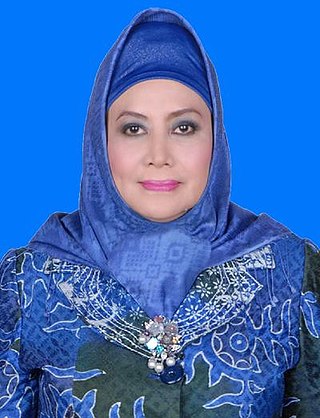Related Research Articles

Suharto resigned as President of Indonesia on 21 May 1998 following the collapse of support for his 32-year long presidency. Vice President B. J. Habibie took over the presidency.

The May 1998 Indonesia riots, also known in Indonesia as the 1998 tragedy or simply the 1998 event, were incidents of mass violence, anti-government demonstrations, and civil unrest in Indonesia in May 1998. The events were mainly in the cities of Medan, Jakarta and Surakarta, with small incidents in other regions of the country.
The Declaration on the Elimination of Violence Against Women was adopted without a vote by the United Nations General Assembly in the 48/104 resolution of 20 December 1993. Contained within it is the recognition of "the urgent need for the universal application to women of the rights and principles with regard to equality, security, liberty, integrity and dignity of all human beings". It recalls and embodies the same rights and principles as those enshrined in such instruments as the Universal Declaration of Human Rights, and Articles 1 and 2 provide the most widely used definition of violence against women.
Mely Tan Giok Lan, professionally known as Mely G. Tan, was an Indonesian sociologist. Tan obtained her bachelor's degree from the University of Indonesia, later receiving a scholarship to study at Cornell University. After finishing her doctorate at University of California, Berkeley, Tan returned to Indonesia and wrote extensively on economics and Chinese Indonesians. She was a founding commissioner of the National Commission on Violence against Women.
The Tanjung Priok massacre was an incident that occurred on 12 September 1984, in the port area of Tanjung Priok, Jakarta, Indonesia. Government reports give a total of 24 killed and 54 injured, while survivors report over 100 killed.
The National Commission on Human Rights is the national human rights institution (NHRI) of Indonesia. As with other NHRIs, its principal functions are the protection and promotion of human rights.

The General Elections Commission is the body that organises elections in Indonesia. Its responsibilities include deciding which parties can contest elections, organising the voting and announcing the results and seats won in the various branches of the government.
Julia Indiati Suryakusuma is an Indonesian feminist, journalist, and author. She is known for her outspoken writing on sexuality, gender, politics and religion. She has been described as Indonesia's most provocative columnist.

Melani Leimena Suharli is an Indonesian politician from the Democratic Party who has been a member of the People's Representative Council since 2009. Between 2009 and 2014, she served as the deputy speaker of the People's Consultative Assembly.

The Ministry of Women Empowerment and Child Protection (MoWECP) of the Republic of Indonesia, formerly the Ministry of Women's Empowerment of the Republic of Indonesia is a government ministry responsible for the rights and welfare of women and children of Indonesia. The minister is currently I Gusti Ayu Bintang Darmawati since 23 October 2019.
The Semanggi shootings in Jakarta, Indonesia, were two incidents when state troops opened fire on unarmed civilians and protesters during special sessions of parliament. The first incident, known as Semanggi I, took place on 13 November 1998 and 17 people were killed. The second incident, Semanggi II, took place on 24 September 1999 and 12 people were killed and more than 200 wounded.

The Commission for Missing Persons and Victims of Violence is an Indonesian human rights organization established in 1998 to investigate forced disappearances and acts of violence. It was founded by human rights activist Munir Said Thalib, who in 2004 was poisoned on a flight to Amsterdam.

Feminism in Indonesia refers to the long history of discourse for gender equality to bring about positive social change in Indonesia. The issues women in Indonesia currently are facing include gender violence, underage marriages, and lack of representation in the political system. Feminism and the women's right movement began during colonial Indonesia under Dutch rule and were spearheaded by the national heroine Kartini, a Javanese noblewoman who advocated for the education of all women and girls regardless of social status. In the early 19th century, women's rights organizations and movements were allowed to developed under Budi Utomo, the first Indonesian Nationalist organization. Modern day Indonesian feminism include and are influenced by both fundamentalist and progressive Islamic women's organizations.
The Law on Sexual Violence Crimes is a law aimed to tackle sexual violence in Indonesia. The bill of the law was proposed on January 26, 2016. The law focuses on the prevention of sexual violence, more rights for victims and to acknowledge marital rape.
Rotua Valentina Sagala is an Indonesian women's rights activist and activist for law and human rights. In 2013 she won the N-Peace Award.
On Monday, 26 July 2021, a deaf Papuan man named Steven Yadohamang was assaulted by two Indonesian Air Force Military Police from Johanes Abraham Dimara Air Base, Merauke Regency, Papua. A video recording the incident went viral and sparked substantial national concern. There are several versions circulating on the internet of how the incident began. The incident caused public outrage both in Indonesia and overseas, as well as leading to some high-ranking officials being fired.
Fientje Salomina Jarangga is a women's rights activist from Papua, Indonesia, who is the coordinator of the Papuan Women's Human Rights Network. She campaigns against domestic violence in Papua.

Dolorosa Sinaga is an Indonesian sculptor, feminist and human rights activist. She was previously dean of the faculty of fine arts at the Institut Kesenian Jakarta and founder of the Somalaing Art Studio which she has operated in Jakarta since 1987. Her works appear in the National Gallery of Indonesia and internationally.
Azriana Manalu is an Acehnese women's rights activist and lawyer, who was Chair of the National Commission on Violence against Women in Indonesia.
Saparinah Sadli is an Indonesian psychologist and activist. She spearheaded the establishment of the Department of Women's Studies at the University of Indonesia, and was the inaugural chairperson of the National Commission on Violence against Women.
References
- ↑ Purdey, Jemma (2006). "6 Regime Change and Transition". Anti-Chinese Violence in Indonesia, 1996-1999. BRILL. pp. 162–206. ISBN 978-90-04-48656-0.
- 1 2 3 "Profil Komnas Perempuan". Komisi Nasional Anti Kekerasan Terhadap Perempuan (in Indonesian). Retrieved 16 December 2022.
- ↑ McGregor, Katharine; Loney, Hannah (2020). "Introduction: Gendered violence in the making of modern Indonesia". In McGregor, Katharine; Loney, Hannah; Dragoljovic, Ana (eds.). Gender, violence and power in Indonesia : across time and space. New York: Taylor & Francis. ISBN 9781000050387.
- ↑ Setiawan, Ken (January 2016). "From Hope to Disillusion: The Paradox of Komnas HAM, the Indonesian National Human Rights Commission". Bijdragen tot de Taal-, Land- en Volkenkunde / Journal of the Humanities and Social Sciences of Southeast Asia. 172 (1): 1–32. doi: 10.1163/22134379-17201002 .
- 1 2 3 4 "Sejarah Komnas Perempuan". Komisi Nasional Anti Kekerasan Terhadap Perempuan (in Indonesian). Retrieved 16 December 2022.
- 1 2 Muntarbhorn, Vitit (2006). Mixed Blessings. Brill Nijhoff. pp. 54–7. doi:10.1163/9789047409656_010. ISBN 978-90-474-0965-6. S2CID 155189930.
- ↑ Hartiningsih, Maria; Pambudy, Ninuk Mardiana (28 June 2010). "Guru Kehidupan" [Life Teacher]. Kompas (in Indonesian). Archived from the original on 1 May 2024. Retrieved 30 April 2024.
- ↑ Ulung, A. Kurniawan (25 July 2017). "Saparinah Sadli continues to fight for justice". The Jakarta Post. Archived from the original on 28 July 2017. Retrieved 1 May 2024.
- ↑ National Commission on Violence against Women 2014, pp. 46–47.